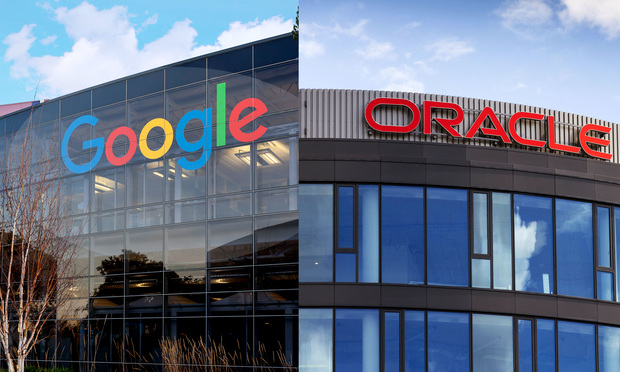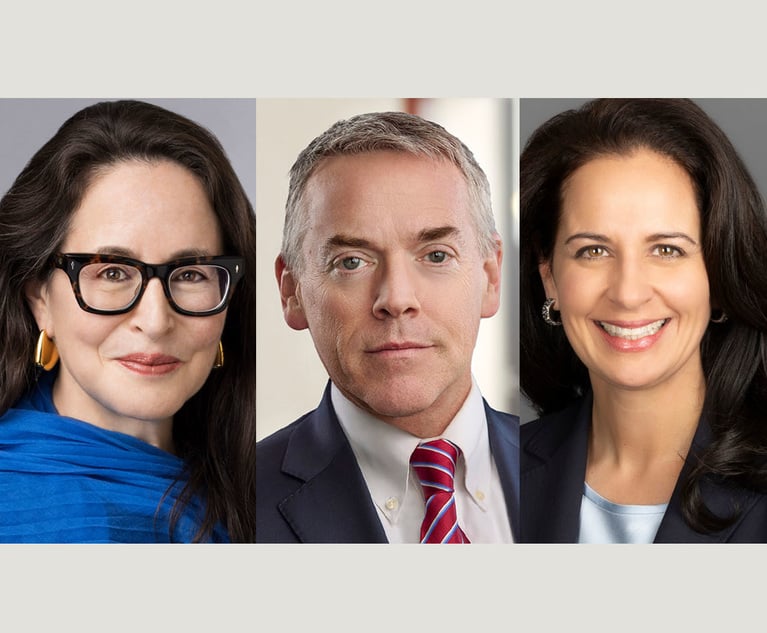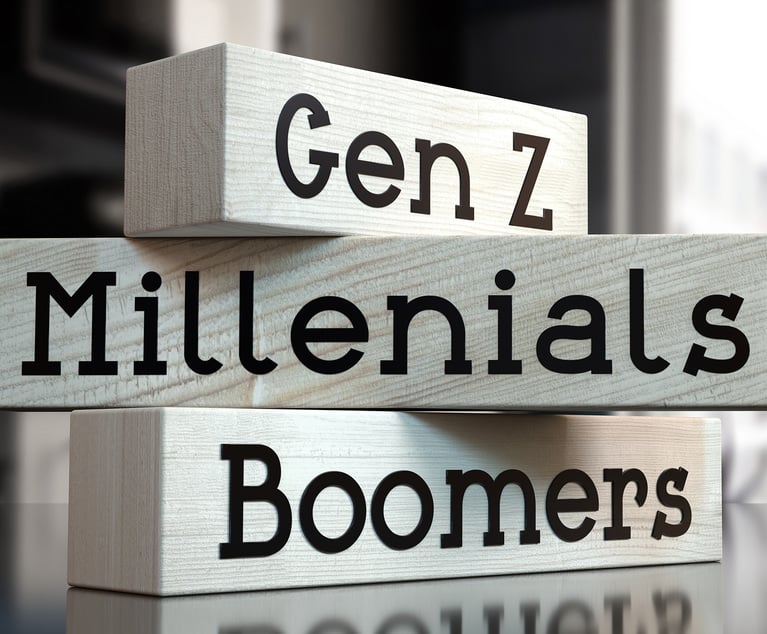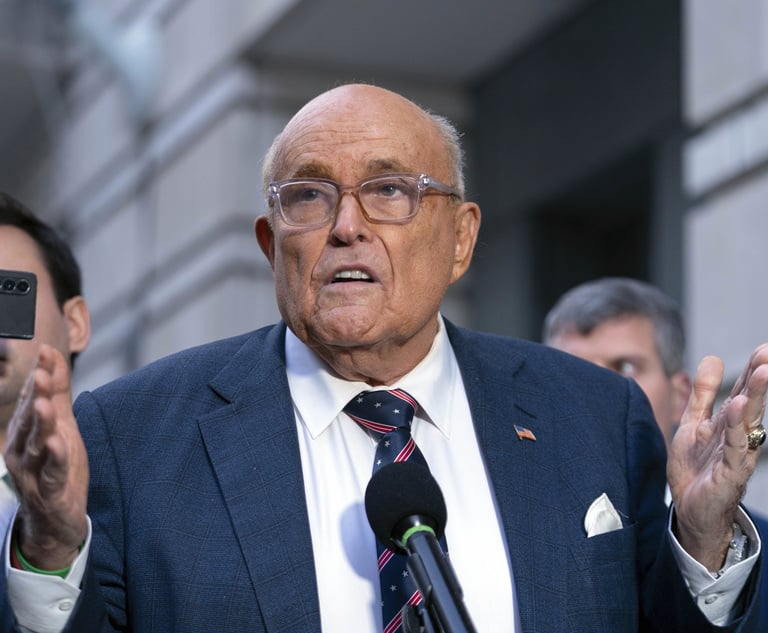Why Oracle Might Be Sweating a Request for Extra Briefing in Fight With Google
The Supreme Court wants the parties to address the standard of review for assessing the San Francisco jury's verdict on fair use. If the Supreme Court applies a stricter standard than the Federal Circuit, then Google probably wins.
May 04, 2020 at 06:16 PM
4 minute read
The original version of this story was published on The Recorder

The U.S. Supreme Court has been sending up some smoke signals in the copyright showdown between Google and Oracle. And they're forming clouds over Oracle's position.
Google v. Oracle is a 10-year-old battle royal in which Oracle is seeking as much as $9 billion over Google's unauthorized use of code from Java application program interfaces in its Android operating system. The case has gone through two San Francisco jury trials, with the second finding that Google's copying was a fair use. The U.S. Court of Appeals for the Federal Circuit ruled in 2014 that the code is copyrightable, and in 2018 that no reasonable jury could have found fair use.
The Supreme Court is reviewing both decisions. They'd been scheduled for argument last month but have been pushed back to the fall due to COVID-19 disruptions.
The first wisp of smoke came April 27, when the court issued Georgia v. Public.Resource.Org. Chief Justice John Roberts wrote for a 5-4 majority in that opinion that Georgia cannot block citizens, attorneys and others from copying and displaying the annotations.
"Some affected parties might be willing to roll the dice with a potential fair use defense," Roberts wrote. "But that defense, designed to accommodate First Amendment concerns, is notoriously fact sensitive and often cannot be resolved without a trial."
This observation seemed nonessential to the decision. The words "fair use" appear nowhere else in the majority or dissenting opinions. But the amount of deference that appellate courts must show to jury fact-finding is very much part of Google's fair use case.
That could be written off as a line of stray dicta. But on Monday, the court asked Google and Oracle to file 10-page supplemental briefs addressing "the appropriate standard of review for the second question presented, including but not limited to the implications of the Seventh Amendment, if any, on that standard."
The parties have already broached the subject in their merits briefs.
Although the Federal Circuit concluded in the first appeal that it could not decide fair use as a matter of law because of the fact-intensive nature of the inquiry," Google argued in its Jan. 6 brief, "the court took the extraordinary step in the second appeal of reversing the jury's verdict based on the court's own weighing of the evidence—an unprecedented action by an appellate court. In so doing, the court inverted the proper substantial-evidence standard of review."
Oracle argued in its brief that the Supreme Court, in its famous Harper & Row v. Nation Enterprises decision on fair use, described it as a mixed question of law and fact, and said that an appellate court "may conclude as a matter of law that the challenged use does not qualify as a fair use."
Google argues that the Supreme Court was referring to fair use cases decided on summary judgment. "Fair use jury trials are almost unheard of, precisely because fair use so rarely revolves around disputed facts," Oracle argues. "And a trial does not turn a legal question into a factual one."
When the case was last before the Federal Circuit, Judge Kathleen O'Malley wrote that the Supreme Court had described fair use as an equitable rule of reason, making it an issue for judges to decide. "That said, the Supreme Court has never clarified whether and to what extent the jury is to play a role in the fair use analysis," she wrote.
The parties have until August to file their briefs. Google is represented by Goldstein & Russell; Williams & Connolly; Keker, Van Nest & Peters; King & Spalding; and Kwun Bhansali Lazarus.
Oracle is represented by Orrick, Herrington & Sutcliffe and Kirkland & Ellis.
This content has been archived. It is available through our partners, LexisNexis® and Bloomberg Law.
To view this content, please continue to their sites.
Not a Lexis Subscriber?
Subscribe Now
Not a Bloomberg Law Subscriber?
Subscribe Now
NOT FOR REPRINT
© 2025 ALM Global, LLC, All Rights Reserved. Request academic re-use from www.copyright.com. All other uses, submit a request to [email protected]. For more information visit Asset & Logo Licensing.
You Might Like
View All
A Second Straight Year of Increased Securities Filings—With Perhaps More on the Horizon

Firms Come Out of the Gate With High-Profile Litigation Hires in 2025

Some Thoughts on What It Takes to Connect With Millennial Jurors
Law Firms Mentioned
Trending Stories
- 1Law Firms Expand Scope of Immigration Expertise, Amid Blitz of Trump Orders
- 2Latest Boutique Combination in Florida Continues Am Law 200 Merger Activity
- 3Sarno da Costa D’Aniello Maceri LLC Announces Addition of New Office in Eatontown, NJ, and Named Partner
- 4Friday Newspaper
- 5Public Notices/Calendars
Who Got The Work
J. Brugh Lower of Gibbons has entered an appearance for industrial equipment supplier Devco Corporation in a pending trademark infringement lawsuit. The suit, accusing the defendant of selling knock-off Graco products, was filed Dec. 18 in New Jersey District Court by Rivkin Radler on behalf of Graco Inc. and Graco Minnesota. The case, assigned to U.S. District Judge Zahid N. Quraishi, is 3:24-cv-11294, Graco Inc. et al v. Devco Corporation.
Who Got The Work
Rebecca Maller-Stein and Kent A. Yalowitz of Arnold & Porter Kaye Scholer have entered their appearances for Hanaco Venture Capital and its executives, Lior Prosor and David Frankel, in a pending securities lawsuit. The action, filed on Dec. 24 in New York Southern District Court by Zell, Aron & Co. on behalf of Goldeneye Advisors, accuses the defendants of negligently and fraudulently managing the plaintiff's $1 million investment. The case, assigned to U.S. District Judge Vernon S. Broderick, is 1:24-cv-09918, Goldeneye Advisors, LLC v. Hanaco Venture Capital, Ltd. et al.
Who Got The Work
Attorneys from A&O Shearman has stepped in as defense counsel for Toronto-Dominion Bank and other defendants in a pending securities class action. The suit, filed Dec. 11 in New York Southern District Court by Bleichmar Fonti & Auld, accuses the defendants of concealing the bank's 'pervasive' deficiencies in regards to its compliance with the Bank Secrecy Act and the quality of its anti-money laundering controls. The case, assigned to U.S. District Judge Arun Subramanian, is 1:24-cv-09445, Gonzalez v. The Toronto-Dominion Bank et al.
Who Got The Work
Crown Castle International, a Pennsylvania company providing shared communications infrastructure, has turned to Luke D. Wolf of Gordon Rees Scully Mansukhani to fend off a pending breach-of-contract lawsuit. The court action, filed Nov. 25 in Michigan Eastern District Court by Hooper Hathaway PC on behalf of The Town Residences LLC, accuses Crown Castle of failing to transfer approximately $30,000 in utility payments from T-Mobile in breach of a roof-top lease and assignment agreement. The case, assigned to U.S. District Judge Susan K. Declercq, is 2:24-cv-13131, The Town Residences LLC v. T-Mobile US, Inc. et al.
Who Got The Work
Wilfred P. Coronato and Daniel M. Schwartz of McCarter & English have stepped in as defense counsel to Electrolux Home Products Inc. in a pending product liability lawsuit. The court action, filed Nov. 26 in New York Eastern District Court by Poulos Lopiccolo PC and Nagel Rice LLP on behalf of David Stern, alleges that the defendant's refrigerators’ drawers and shelving repeatedly break and fall apart within months after purchase. The case, assigned to U.S. District Judge Joan M. Azrack, is 2:24-cv-08204, Stern v. Electrolux Home Products, Inc.
Featured Firms
Law Offices of Gary Martin Hays & Associates, P.C.
(470) 294-1674
Law Offices of Mark E. Salomone
(857) 444-6468
Smith & Hassler
(713) 739-1250







